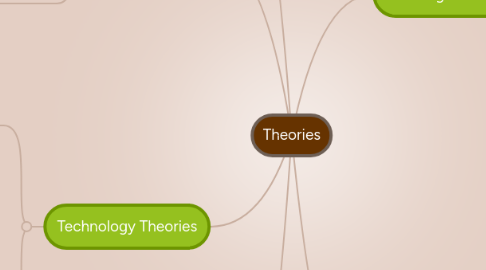
1. Learning Theories
1.1. Constructivism
1.1.1. All about the person.
1.1.2. The person building their knowledge.
1.1.3. The mind is a rhizome (network).
1.1.4. Learning is building connections by actively interacting with the environment.
1.1.5. Students can’t learn without doing something.
1.2. Cognitive Overload
1.2.1. The mind is a computer.
1.2.2. Information overload of the working memory impairs learning.
1.2.3. Sensory memory → Working memory → Short Term Memory → Long Term Memory
1.2.4. You need motivation for the information to stick.
1.3. Connectivism
1.3.1. Learning is the process of creating connections and developing a network.
1.3.2. A learning theory for the digital age: there is so much info out there that your best bet is to create networks so when you need something, you are networked to something or someone that can help you.
1.3.3. Learning is the ability to traverse the networks and know how to get info as opposed to having that knowledge already.
2. Implications for Education
2.1. These learning theories have various implications for education. I believe that each theory is used at different times and ways in a classroom, and that you can't pinpoint one theory specifically that is used most often. Every teacher will teach differently and every child will learn differently. Each theory has it's place in a classroom and it is up to the teacher to figure out which theory suits the needs of their students the most.
2.1.1. Examples:
2.1.1.1. Media Ecology: television and computer are an example of this. Humans are affected by technology, not the other way around.
2.1.1.2. Constructivism: People learn best when they are able to connect new information with old information.
2.1.1.3. Cognitive Overload: teachers have to be sure not to give their students too much information at once.
2.1.1.4. SCOT: VHS is an example of this, which can be implemented into classrooms very easily.
2.1.1.5. Connectivism: The teacher provides ways for the students to make connections with knowledge.
3. Connections
3.1. Every learning strategy is used in a classroom one way or another. A teacher may use behaviourist learning strategies to help focus their students, use cognitivist strategies to help their student's learn, constructivist learning strategies to engage their students, and media ecology and SCOT learning strategies to assist their student's learning. Each learning strategy is used to better student's learning and help them become as successful as they can be. I believe that every child will use a learning theory more than another, but all must be used to ensure the best learning possible is taking place.
4. Technology Theories
4.1. SCOT
4.1.1. Social Construction of Technology
4.1.2. Technology does not shape what we do, rather we shape technology.
4.1.3. Used to analyze how successful a piece of technology is or not.
4.1.4. Technology is affected by humans.
4.2. Media Ecology
4.2.1. Technology profoundly influences society.
4.2.2. Media and communication technology affects human perception.
4.2.3. Media communication affects how we feel and what we value.
4.2.4. Difficult to define.
4.2.5. Humans are affected by technology.
